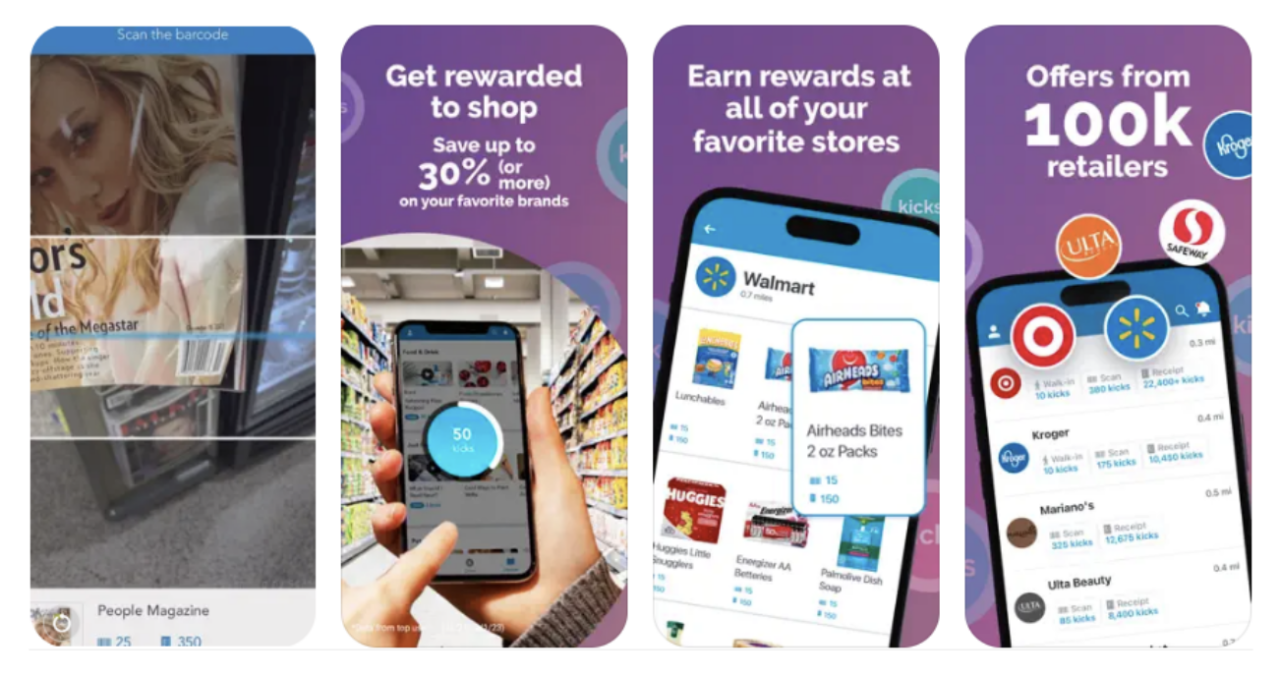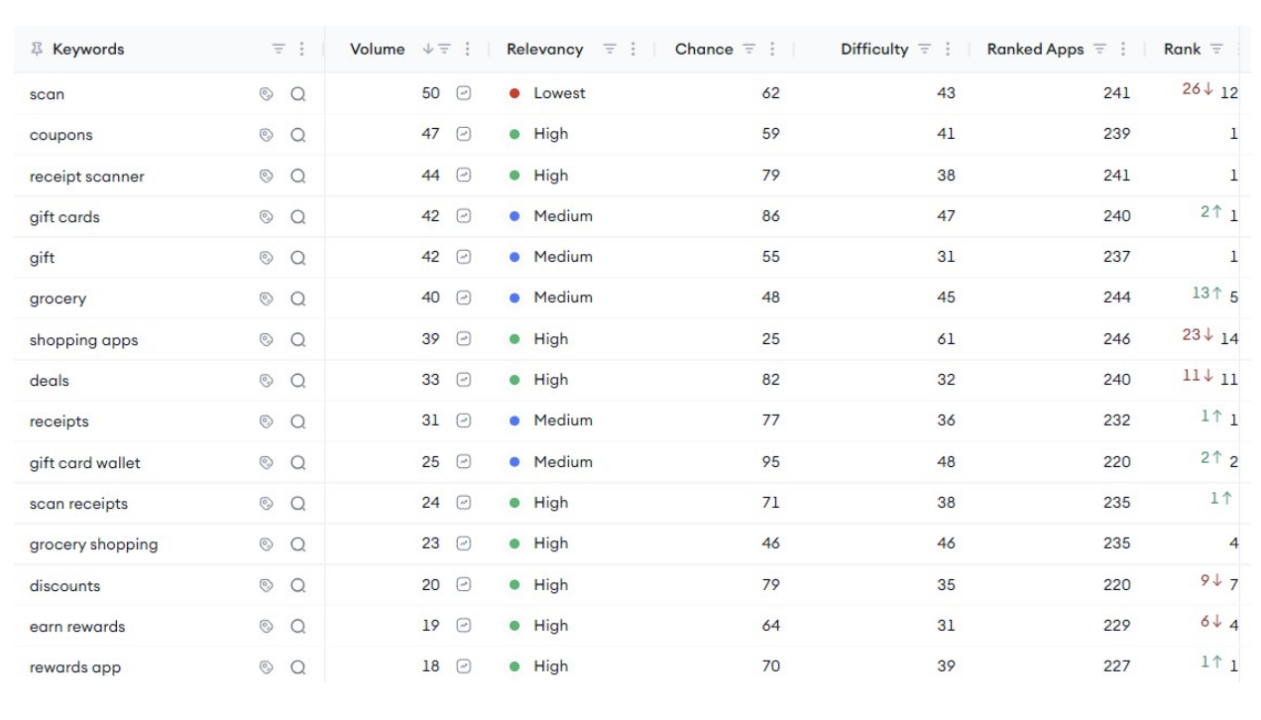
Shopkick ASO Audit Report
Shopkick iOS App
Shopkick is among the shopping rewards in app stores today. With over a million people downloading the app, Shopkick has enjoyed a relatively high ranking in the App Store. In fact, Shopkick by the time of this writing, is rated to be the #73 apps in Shopping based in the United States.
While Shopkick has already accomplished things that other shopping rewards haven’t achieved, there is still a way to maximize their app store visibility and increase their chance of getting noticed.
After all, the biggest room is the room for improvement. No matter how great Shopkick might already be, they can still do something to reach the number 1 spot and not be overtaken by competitors.
In this ASO audit, let’s take a look at how Shopkick can improve its keyword ranking in the most efficient way possible.
Shopkick Keyword research
We did a quick keyword research for Shopkick based in the United States. We have shared the details at the end of this post.
Looking at the research result, we can see that we are already ranking for some important keywords. Nevertheless, we have identified some great opportunities for us to take advantage of.
In this situation, ASO intelligence tools come in handy. These tools are effective in identifying popular keywords with the lowest competition. For example, in ShyftUp, we use Mobile Action to perform reliable keyword research.
Among the results we get is the term Search Score. Here’s a quick overview:
The Search Score ranges from 5 to 100. The score represents the number of users who are searching for a specific keyword compared to other keyword options in the App Store and Google Play.
For example, one of the keywords with the highest ranking is the keyword “Facebook.” It has a search score of 100.
The lowest score is 5, which means no one is virtually searching for that keyword. Most keywords will never even see a score beyond 5.
Going back to the results that we got, here’s how Shopkick’s ranking looks like:
- “Scan” keyword has a search score of 50, which we rank at no. 126.
- “Coupons” keyword has a search score of 47, which we rank at no. 16.
- “Gift” keyword has a search score of 42, which we rank at no. 12.
- “Gift cards” keyword has a search score of 42, which we rank at no. 11.
- “Grocery” keyword has a search score of 40, which we rank at no. 50.
- “Deals” keyword has a search score of 33, which we rank at no. 118.
- “Receipts” keyword has a search score of 31, which we rank at no. 12.
- “Gift card wallet” keyword has a search score of 25, which we rank at no. 20.
- “Discounts” keyword has a search score of 20, which we rank at no. 70.
- “Earn rewards” keyword has a search score of 19, which we rank at no. 42.
- “Rewards app” keyword has a search score of 18, which we rank at no. 12.
We also did research on competitor keywords. We got the following results:
- “Rakuten” keyword has a search score of 64, which we rank at no. 12.
- “Fetch Rewards” keyword has a search score of 63, which we rank at no. 7.
- “Upside” keyword has a search score of 59, which we rank at no. 10.
- “Honey” keyword has a search score of 55, which we rank at no. 74.
- “TopCashback” keyword has a search score of 39, which we rank at no. 12.
- “RetailMeNot” keyword has a search score of 33, which we rank at no. 10.
The results show us that there is a lot of work to do. To ensure that we climb up the rankings, we should use these keywords in our metadata.
Title
The title of Shopkick in the App Store is this:
Shopkick: Gift Cards Rewards
Shopkick already has a strong title. Take note that the App Store allows us to use up to 30 characters for the title. As of now, Shopkick is using 28 characters.
Looking at the search scores of the keywords included in the title, the search score of “gift” is 42, “cards” is 42 and “rewards” is 45. As you can see, all of the keywords have high search scores, and we can conclude that Shopkick has a quite strong title. However, there is a great opportunity for improvement.
To ensure we stay competitive, we must test the title and its keywords continuously. One way to improve the title is to go to the keyword pool. From there, we should continuously check how many keywords we are ranking for that are in the title. For instance, we could check the keyword “earn rewards” in our keyword pool.
After starting to use the “earn rewards” keyword, do we start ranking higher for these keywords? Do we start ranking for more keywords that include “earn rewards”? If the keywords are not improving our ranking, then we should test other keywords and their variations.
In this case, we can try a new title like:
Shopkick: Shopping Rewards
As you can see, we have added the words “shopping” and removed the words “gift” & “cards”. This is a great move in terms of keyword ranking for the following reasons:
- The term “shopping” has a high search score of 59.
- By adding the term “shopping” we can potentially rank for longer search terms such as “shopping apps” & “grocery shopping”. Both have good ranking scores, which are 39 & 23, respectively.
All these changes to the title can potentially improve keyword ranking. However, please note that there are other combinations and possibilities when it comes to using keywords.
That’s the reason you need to constantly test these keywords. You should check your keyword ranking every week and see if the changes in your title bring better results.
Subtitle
The subtitle of Shopkick in the App Store is this:
Get Cash Back & Reward Coupons
Like the title, Apple allows us to use up to 30 characters in the subtitle. As of now, Shopkick uses 30 characters.
Looking at the search scores of the keywords included in the subtitle, the search score of “get” is 47, “cash” is 53, “back” is 46, “reward” is 29 & “coupons” is 47. As you can see, all keywords have high search scores, and we can conclude that Shopkick has quite strong subtitles.
Even though, if we would like to test a new variation, the subtitle can be changed to:
Cash Back, Coupons, Deal, Scan
As you can see, we have added the words “deal & “scan” and excluded the words “get” & “reward”. This is a great move in terms of keyword ranking for the following reasons:
- The term “deal” has a high search score of 31.
- The term “scan” has a high search score of 50.
- By adding the term “scan” we can potentially rank for longer search terms such as “receipt scanner” & “scan receipts”. Both have good ranking scores, which are 44 & 24, respectively.
To ensure we stay competitive, we must test the subtitle and its keywords continuously. One way to improve the subtitle is to go to the keyword pool. From there, we should continuously check how many keywords that are in the subtitle. For instance, we should check the keyword “cash back rewards” in our keyword pool.
After starting to use the “cash back rewards” keyword, do we start ranking higher for these keywords? Do we start ranking for more keywords that include “cash back rewards”? If the keywords are not improving our ranking, then we should test other keywords and their variations.
Ratings
Looking at the ratings, we can see a lot of things to improve here. Take note that Shopkick, at the time of this writing, has an average rating of 4.6 stars from more than 84K users.
Let’s compare that to their competitors:
- Fetch Rewards – 4.8 stars from 5.8M users
- Ibotta– 4.8 stars from 1.8M users
We do need to improve app features and overall user experience to raise the ratings up and get more positive reviews.
Screenshots
Screenshots can either make or break your app. If you use the wrong screenshots, you’ll surely chase away users. Use the right screenshots, and you’ll attract more users.
As we take a look at Shopkick’s screenshots, we can see that they have chosen great images. However, Shopkick can use more value-oriented headlines on the screenshots. It is super important to choose screenshots that show the value, features, and reasons why users should use your app. Here are some of our feedback for Shopkick:
- Screenshot Orientation: Since iPhone users represent 80-85% of the combined iPhone and iPad user base, iPad screenshots appearing first can be replaced with iPhone-oriented ones.
- Readability: The font size is adequate. Headlines make grammatical sense. Different font styles can be A/B tested.
- Headline strength: The current messaging is strong. However, different messaging can be A/B tested.
- Social Proof: Testimonials, media coverage, # of downloads, etc. could be showcased.
- Cover Screen & Image:: A new cover screen can be created with a “Gift Cards” & “Cash Back” image.
- Video (App Preview): A preview video added through the app’s functions to the first slot, which is good.
The App Store allows us to use up to 10 screenshots. However, these screenshots don’t have equal exposure. As you may already know, potential users will initially see the first three screenshots. They need to open your page to see the rest of the screenshots.
With this in mind, you need to choose the best screenshots and place them on the first three screenshot slots.
To determine which screenshots give you the best result, A/B testing and Apple’s Product Page Optimization (PPO) are always the best way to go.
Here are a few more things to consider:
- Apple indexes the title, subtitle, and keyword list to determine app rankings in the App Store.
- The app title, which can be composed of up to 30 characters, is considered to be the most important ranking factor. Thus, you should add the most crucial keyword to your title. When you do that, you’ll most likely get a higher ranking for that keyword.
- Next to the app title is the subtitle in terms of importance for indexing. Thus, other more vital keywords should be added to your subtitle. Add as many relevant and high-ranking keywords as possible to ensure you increase your ranking. Moreover, if possible, maximize the 30 character-limit for the subtitle.
- The keyword list is considered to be the number 3 most important ranking factor in the App Store. You are allowed to use a maximum of 100 characters. You need to add all the keywords that you believe are relevant to your app. You can even include brand names and competitors’ keywords. You have more flexibility to include whatever you see fit based on your keyword research. After all, users won’t be able to see this list. Only you, as the admin, can see them via the App Store Connect. But it affects your visibility significantly.
This data is pulled from Mobile Action.
Disclaimer: In this ASO Audit, we haven’t used any private data, we have purely used public data.


